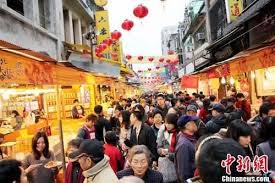好朋友,請多支持週六聚會 有您支持 這個英文口語練習平台 才有機會成長
***2/8 年終聚餐party 歡迎您來同樂 詳情網頁首頁 尾牙趴資訊 或加入說吧line 群組
會中有個歡樂二手物拍賣會 拿您不需要用品 9成新 大家共同累積些基金 將來慈善用途
感謝 Sherry 承辦

 年貨大街
年貨大街
Many options available as consumers prepare
for the Lunar New Year holiday FTV
There are many channels available for
consumers who hope to buy Lunar New Year’s products. Competition from
convenience stores, online merchants and others is proving to be a stiff
challenge to traditional vendors on Taipei’s Dihua Street.
The Taiwan New Year Market Fair at the
World Trade Center tallied revenues of NT$300 million last year. This year’s
fair opens on Feb. 4 and will feature twice as many booths and new services.
Peter Huang
TAITRA Secretary-General
Besides being able to buy new year’s
products, there will be places to relax and eat along with a recreation area
for children. Parents will be able to leave their children at the recreation
area while they go shopping.
Convenience stores hope to win over
consumers by promoting ease of purchase.
Hypermarkets are focusing on diversity and
low prices.
Those hoping to avoid crowds can shop
online.
“These can be purchased online and at
hypermarkets. You don’t have to come to Dihua Street.”
Dihua Street in Taipei has traditionally
been the most popular place in the capital to buy new year’s products. But this
year many booths have yet to be leased.
Dihua Street Vendor
In the past these spaces were all leased
out by the time of the Mid-Autumn Festival.
At its peak, there were 500 booths on Dihua
Street that cost up to NT$700,000 each to lease. This year there will be around
200 booths available for about NT$200,000 each.
Questions:
What are your Chinese New Year holiday
plans?
How to celebrate Chinese New Year? What are
the New Year traditions?
How to prepare for the New Year food?
Have you ever gone shopping at Taipei’s Doha
Street?
Where are the ideal places for consumers to
buy lunar New Year’s products?
What do you think about Taiwanese food
market?
What are the traditional Chinese new year food?
What do you think the food safety issues?

購物狂
The Truth About Shopaholics by Jeanna Bryner, Live Science
The stereotypical shopaholic darting from store to store to pick up anything and everything while racking up a hefty credit-card bill is anything but stereotypical. They come in all shapes and sizes.
New research reveals while some super-shoppers spend to boost self-esteem and band-aid other perceived internal deficits, others' carts are driven by plain-old materialism. Whatever the motivation, however, researchers mostly agree that buying behaviors can range from frivolous fun to serious addiction.
And, it seems, over-shopping is on the rise.
Compulsive buying can be thought of as a chronic tendency to purchase products far in excess of a person’s needs and resources.
"There are some people who are just total rational consumers; they buy what's on sale, or what they need and nothing else," said researcher James Roberts of Baylor University's Hankamer School of Business in Texas. "On the other end, there are compulsive shoppers who buy to their own financial ruin and to relationship problems and other kinds of debt; and then there's the rest of us somewhere in between."
Part of the problem, experts say, is that compulsive shopping is often viewed favorably rather than being treated as a problem.
Like an addiction
Some researchers have likened compulsive buying to other addictive behaviors that individuals use to escape life to the point where that behavior controls the person rather than vice versa.
"When it becomes our natural response to bad feelings or bad events in our life, to go shopping as a kind of retail therapy, it can really become a problem," Roberts told LiveScience.
The consequences of compulsive shopping are far-reaching and could outlast the trendy pair of shoes or digital device you just purchased. These include massive credit-card debt, spoiled relationships, work problems and depression and anxiety, according to the Illinois Institute for Addiction Recovery.
Some excessive spenders cover up debt or purchases — similar to an alcoholic hiding bottles — which can strain once-honest relationships.
"They suffer a lot because of the emotional drain of being in debt and wondering what's going to happen, carrying these huge credit-card balances that go up and up and up," said Stanford University psychiatrist Lorrin Koran. "It can cause a lot of suffering and family dysfunction, because there are arguments about, 'Why are you buying these things you don't use?; why are you spending this money?'"
Koran recalls some of the compulsive buyers in his research declaring bankruptcy and getting divorced over their buying disorder. One woman was within weeks of losing her house.
Although the consequences can be "quite severe," Koran says the so-called impulse control disorder is treatable and urges those afflicted to seek psychiatric help.
Questions:
Why some are addicted to shopping?
The reasons we shop too much?
Can shopping boost self-esteem and help anxiety?
What are the ways to break free from compulsive spending?
How to be a wise consumer? How to spend money wisely?
How advertising manipulates your choices and spending?
How to manage compulsive shopping or spending addiction?
What do you think that buy one get one free business policy?
What are the different types of addictions?









0 意見:
張貼留言